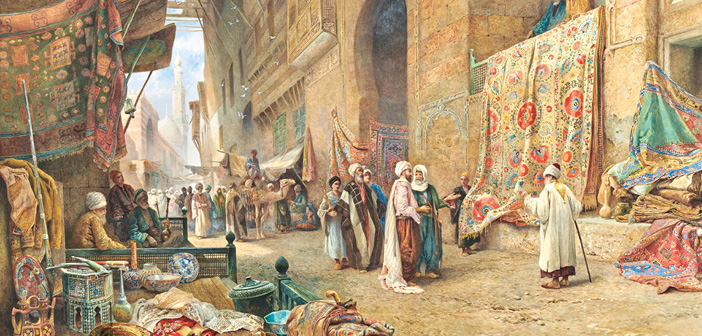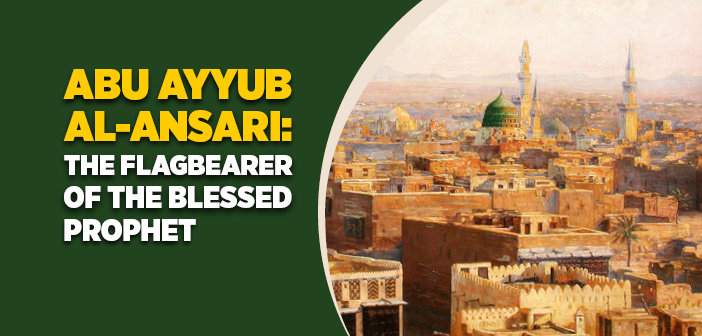What is the minor campaigns in islam? What happened in minor campaigns of islam?
The Blessed Prophet -upon him blessings and peace- now wished to cut off the much used and vital Meccan trade route to Syria[1], and thereby throw the idolaters, still preoccupied with assaulting Muslims in Medina, denying them entrance into their hometowns and inciting the sentiments of hypocrites against them, into an unprecedented commercial and economical strife, and thus prevent them from gaining even further strength against Muslims.[2] With this intention in mind, seven months after the Hegira, the Noble Prophet -upon him blessings and peace- sent thirty men from the Muhajirun, under the leadership of Hamza -Allah be well-pleased with him-, to Sif’ul-Bahr.[3] (Rajab 8/November-December, 623)
Returning from Damascus, the trade caravan bound for Mecca had now made it to Sif’ul-Bahr, under the protection of three-hundred cavalrymen, including Abu Jahl. Just when two sides were getting in line in preparation for a seemingly inevitable clash, Majdi ibn Amr, an ally of both sides, intervened and dissuaded both sides from fighting. Upon hearing it, the Blessed Prophet -upon him blessings and peace- was pleased with Majdi’s intervention and praised his negotiating skills; in appreciation of which he sent Majdi’s delegates, who later arrived, away with many presents.[4]
For the same purpose, eight months after the Hegira in the first days of the month of Shawwal, the Blessed Prophet -upon him blessings and peace- deployed under the leadership of Ubayda ibn Harith -Allah be well-pleased with him- sixty to eighty Muhajir, to Rabigh.[5]
Lead by Abu Sufyan, Quraysh were around two-hundred in number. Apart from a light skirmish and the shooting of few arrows, both sides neither lined up nor drew their swords to fight. Shooting the first arrow that day was Saad ibn Abi Waqqas -Allah be well-pleased with him-, who is therefore celebrated as the first arrow shooter of Islam. Fearing Muslims would be relieved with the arrival of back up forces, the idolaters retreated and both sides parted ways.
Although having become Muslim a while before, two Companions, Miqdad ibn Amr and Utbah ibn Ghazwan, who until then could not find the means to join the Blessed Prophet -upon him blessings and peace- in Medina, had joined the idolaters as a means to defect to the Muslim side and realize their wish. Immediately upon seeing the Muslim cavalrymen, they got away from the idolaters and sought refuge in Muslim ranks.[6]
Nine months following the Hegira, in the month of Dhil’qadah, the Noble Messenger sent a squad of eight men, (twenty according to other sources), commanded by Saad ibn Abi Waqqas -Allah be well-pleased with him-, to Harrar.[7] (Dhil’qadah 1/ May, 623)
Saad -Allah be well-pleased with him- himself recounts:
“The Messenger of Allah ordered me to, ‘…go until you reach Harrar, as the caravan of Quraysh will pass through there.’ So taking cover at day and moving at night, we reached Harrar in the morning, after five days. But the caravan had apparently passed a day before. Had not the Messenger of Allah ordered me not to go beyond Harrar, I perhaps could have caught up with them.”
The Companions returned to Medina, without coming to blows with the idolaters.[8]
Around the start of the eleventh month of Hegira, in Safar, the Blessed Prophet -upon him blessings and peace- personally led the Campaign of Abwa (Waddan)[9] (Safar 2/August, 623). This was the first campaign in which the Prophet of Allah -upon him blessings and peace- took part. Saad ibn Ubadah -Allah be well-pleased with him-, of the Ansar, was left in charge in Medina.
The Campaign saw no heated clash with the idolaters, though a peace agreement was reached with the Clan of Damra, from the Kinanah tribe, compliant with which both sides were not to attack each other, and they, in addition, were not to engage in any aggression against Muslims and refrain from lending aid to their enemies. The Messenger of Allah -upon him blessings and peace- had the pact confirmed in writing, ending the fifteen day Abwa Campaign[10]. This is only one of the many instances in testimony of the Blessed Prophet’s -upon him blessings and peace- undying penchant for peace and his compassion towards other human beings.
[1] To curb Meccan enmity, the Blessed Prophet -upon him blessings and peace- initiated at first an economical and political embargo, for which purpose he began establishing diplomatical relations with neighboring tribes and organized military campaigns in pursuit of the trade caravans of Quraysh, which constituted virtually the heart of Meccan commerce and economy. Muhammad Hamidullah asserts, in relation, “The raids conducted against the caravans belonging to Quraysh should not be considered as plunder; for neither were Quraysh innocent, nor were the raiders a gang founded just for the purpose of pillaging just any caravan. A full fledged state of war, rather, had emerged between two city-states. A state of war hands over to each warring side the right to do damage to one another’s life, property and other interests. The law of war had thus come into effect between both people. Such military expeditions are therefore certainly not simple interventions and plundering of caravans.”
Another aspect that needs to be considered here is the fact that in all the military expeditions, Muslims had only and strictly attacked Meccan caravans. Despite being non-Believers, other tribes of the peninsula remained safe from these raids. (See, Hamidullah, İslâm Peygamberi, I, 219; Hz. Peygamberin Savaşları, p.56)
[2] Bukhari, Maghazî, 2; Abu Dawud, Kharaj, 22-23/3004.[3] Sif’ul-Bahr, in the region of Iys, where the clan of Juhayna used to reside, was given the name owing to its location by the shore. (bahr means sea)
[4] Waqidi, I, 9-10; Ibn Saad, II, 6.[5] A valley passed by pilgrims on the way to Mecca, Rabigh is a valley located between Anwa and Juhfa, about a distance of 3 miles from the latter.[6] Ibn Hisham, II, 224-225; Waqidi, I, 10; Ibn Saad, II, 7.
[7] Harrar is the name of a spring in Hijaz, near Juhfah. On the way from Juhfah to Mecca, it falls to the left of Mahajja near Ghadir’ul-Hum.[8] Ibn Hisham, II, 238; Waqidi, I, 10; Ibn Saad, II, 7.
[9] Abwa, a village between Furu and Juhfah, is around 23 miles away from Medina. The grave of the Prophet’s -upon him blessings and peace- mother, the honorable Aminah, is found there. Waddan, situated between Mecca and Medina, is 8 miles away from Abwa, and is part of the land near Juhfah which used to belong to the tribes Damra, Ghifar and Kinanah.
[10] Ibn Hisham, II, 223-224; Waqidi, I, 12; Ibn Saad, II, 8.
Source: Osman Nuri Topbaş, The Prophet Muhammed Mustafa the Elect II, Erkam Publications





